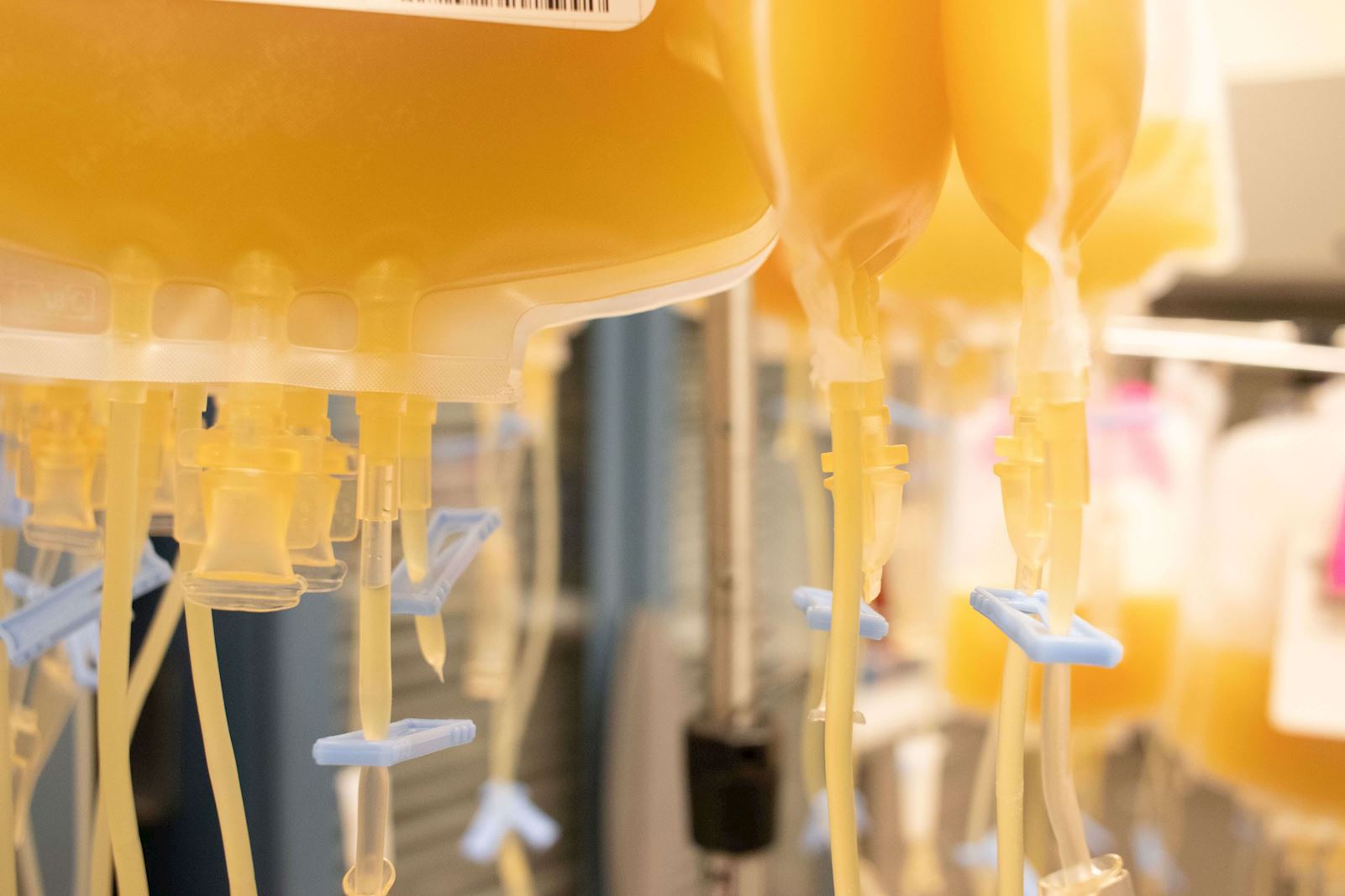
Published by Kirby Winn on Thursday, September 14, 2023 in Blog
What are platelets, and why are they important for the blood supply?
Our blood has four distinct components: red blood cells, white blood cells, plasma, and platelets. When a blood vessel is damaged, platelets help stop or prevent bleeding by moving within the circulatory system to the damaged area. After collecting in the damaged area, platelets extend fibers, changing their shape to form a clot and stop bleeding.
Some people can develop a condition called thrombocytopenia, or a low platelet count, due to cancer or other underlying causes. Patients with thrombocytopenia might bruise easily, experience internal bleeding, or be unable to stop bleeding because their body doesn’t produce enough platelets. Platelets are frequently given to patients with thrombocytopenia, and they are also used in open heart surgery, organ and bone marrow transplants, and with victims of trauma.
![image of donated platelets bags]()
After donation, platelets have just a 7-day shelf life
While red blood cells must be used within 42 days of donation, platelets must be used within just 7 days of donation. This means it’s always a priority for ImpactLife to maintain strong schedules for platelet donation.
During a platelet donation (plateletpheresis), the donor sits in a chair that’s very similar to those used in whole blood donation, but with an automated collection unit placed next to the chair. The donor’s blood is drawn into the collection unit where a centrifuge spins to separate blood components. Once separated, a port opens inside the machine to remove platelets and the remaining blood components are returned to the donor.
Donors can give single, double, or triple units of platelets depending on their overall body mass and platelet count. The entire process, including pre-donation screening and post-donation refreshments, takes approximately 70 minutes to two hours. Donors may watch television, read, listen to music, or simply sit back and relax while helping to save a life.
Eligibility Requirements For Platelet Donations
Platelet donors must meet all of the standard donor eligibility requirements, and there are some additional considerations for medication as well.
- No aspirin or aspirin products can be taken 48 hours before donating, because aspirin affects platelets' ability to function properly.
- Some other medications affect platelets and may result in a temporary inability to donate. Piroxicam (Feldene) use requires a 2-day deferral after stopping. The anti-platelet drugs clopidogrel (Plavix), ticlopidine (Ticlid), cilostazol (Pletal), and Aggrenox (dipyridamole) require a 14-day deferral after stopping. Brilinta (ticagrelor) requires a 7-day deferral after stopping. Effient (Prasugrel) requires a 3-day deferral after stopping.
- Ibuprofen Motrin, Advil and many other non-aspirin drugs ARE acceptable.
The preferred blood types for this procedure are A+, B+, AB+ and AB-, but donors with one of the remaining blood types can also give platelets.
To be certain a medication is acceptable, call 800-747-5401 and ask to speak to someone in Donor Services Auditing. Donors must never stop prescribed drugs in order to donate, unless they have cleared this with their doctor.
Donor Rewards and Scheduling
It’s very important for ImpactLife to continually build our platelet donor base and have consistently strong platelet donor schedules. We often have special Donor Rewards to thank and recognize our valued donors who give platelets. See www.bloodcenter.org/promotions for details on our current promotions.
![platelet donors can donate up to 24 times per year]() Our bodies are constantly replacing platelets so donors are eligible to donate once a week, up to 24 times a year. While donors are eligible to donate more frequently with platelet donations, you don’t necessarily need to commit to giving this often. Our recruitment department is happy to work with you to find a donation frequency pattern that works best for you.
Our bodies are constantly replacing platelets so donors are eligible to donate once a week, up to 24 times a year. While donors are eligible to donate more frequently with platelet donations, you don’t necessarily need to commit to giving this often. Our recruitment department is happy to work with you to find a donation frequency pattern that works best for you.
To inquire about giving platelets or to schedule an appointment, please call our Donor Scheduling team at (800) 747-5401 or email us at hello@impactlife.org.
Tags
- platelets